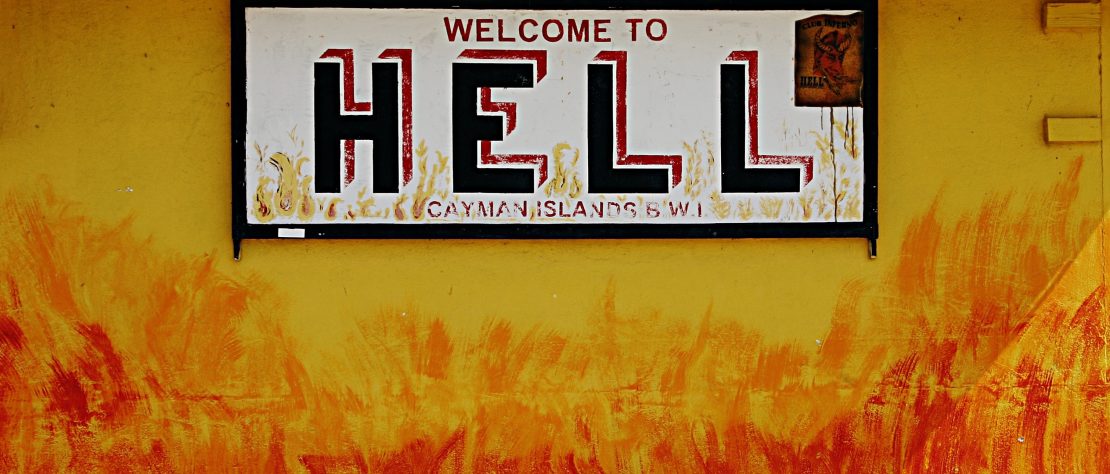Well, where do I start?! Are we ‘going to Hell in a handcart’? In the last edition of this blog I highlighted how difficult it is to be sure these days what is actually going on in the word. In the first edition, though, I suggested that there is definitely something wrong, even if it’s a little intangible, or difficult to articulate. That nebulousness may simply be a result of the information/disinformation overload smokescreen that I highlighted last time.
So, what is it that could be better in our world? What are we actually talking about when one says ‘We’re going to Hell in a handcart’? It is important to make sure that I’m not simply antagonized by change in the world – a ‘things were much better in my day’ worldview. Indeed, things in life cycle, and we move back and forth through periods when, for example, society is more based on communal success and well-being, and periods where entrepreneurial self-generated success are more valued. Again one must take care not to simply be railing against the wheel of life as it turns.
With these caveats, in this edition of Blog of the Future, I’ll discuss some issues that humanity is up against at the moment, but I shan’t condemn them as definitively in need of change. I think the reason to highlight them is more in light of a concern that there are so many distressed situations in the world at the moment, that I feel that a catastrophic tipping point is coming. That situation in chaos theory when the next cycle, with seemingly very similar initial conditions, has a wildly different outcome. 
I will highlight a number of areas of life where we are straining to control negative happenings, but as you read each one, think about this suggestion:
Is there any problem that would not be reduced by smaller population?
(I’m sure I once heard this as a quote by Einstein, but I’ve been unable to find it as such, so apologies to whomever it may be that I’ve stolen/paraphrased it from.)
In a relatively recent article in the London Review of Books (Vol. 39 No. 12 · 15 June 2017) Alex de Waal argued that famine was currently completely avoidable, and it is only political actions that lead to famine; in many cases it is used as a tool of political power. In general, in my mind, corporate power is as great as governmental power. When I refer to political actions, this encompasses the power wielded by the money, and control of the supply of necessities, of big corporations. Now, whether it is easily possible to feed the 7 billion or so in this world, I don’t think I know the facts in enough detail, but given the food excesses of a significant proportion of the countries in the world, it wouldn’t surprise me at all. And even if not wholly accurate, it isn’t likely to be far off – the vast majority of human suffering is human induced. More so than ever before in history. This throws into stark light, what I think is the most significant of the problems we face.
 The modern interconnectedness of the world – communications and transport essentially – has allowed those who would seek to exploit resources a real opportunity to do so to extreme levels. The fact that a new iPhone will sell millions on the first weekend of its global release is both extraordinary and very frightening. How is it that world’s population can be so intertwined that such global success is possible? And when such extreme levels are reached, the Earth’s finite resources will quickly be plundered. Smartphones, as an iceberg tip example, are manufactured with some elements that are pretty rare. Admittedly only tiny quantities in each one, but that’s exactly the point. Tiny quantities are fine, until we start selling smartphones by the billion. The opportunities for significant exploitation have been put in place.
The modern interconnectedness of the world – communications and transport essentially – has allowed those who would seek to exploit resources a real opportunity to do so to extreme levels. The fact that a new iPhone will sell millions on the first weekend of its global release is both extraordinary and very frightening. How is it that world’s population can be so intertwined that such global success is possible? And when such extreme levels are reached, the Earth’s finite resources will quickly be plundered. Smartphones, as an iceberg tip example, are manufactured with some elements that are pretty rare. Admittedly only tiny quantities in each one, but that’s exactly the point. Tiny quantities are fine, until we start selling smartphones by the billion. The opportunities for significant exploitation have been put in place.
Similar issues can be found with every single type of production. The problems of plastic waste’s ubiquity in the oceans is patently unsurprising. If you dig up millions of barrels of oil, whatever you do with it, the molecules aren’t going anywhere. It simply has to remain clogging up the surface of the planet. On land, essentially the same problem is also coming to light with the distribution of chemical fertilizers and pesticides. Nature can deal very effectively with anything, providing it is in small quantities. As soon as we concentrate chemicals beyond a natural amount, there’s going to be trouble.
The large populations living in close proximity, along with easy communications to affect things a long way outside one’s own sphere of activity, means that the opportunities for exploitation are at an unprecedented level. And the rich and powerful are taking every one of these opportunities. Both the environment and the masses of the hoi polloi are being stripped to the very bone, without any long-term planning, or even thought for what future that will be left when the rich are even more ludicrously rich than today. It reminds me of the line from the 1987 film Wall Street: “How many yachts can you water-ski behind? How much is enough?” With such large – global – corporate structures in place, the destruction that some people can do to others does not come home to roost. They cannot be held accountable by those they affect, and this simply encourages the worst excesses of destructive predatory business behaviour.
So, whilst Einstein may have wondered whether we should reduce the population, it is actually more of a problem that we can now act in a way that affects people and we are not directly made uncomfortable when the effects are negative. Many of you reading this will never be known to me directly, so I what I write upsets or offends you, I will not feel the same discomfort as if I were talking to you directly and could feel the social responsibility of my actions, or words, and their effects on you. This is a microcosm example of the underlying cause of the problems facing our world today. Somehow, we need to return to a social situation where what people do affects themselves as much as it affects others. This will serve to ensure that much more thought and concern, and planning, goes into corporate and governmental activities.
 In my new novel, 2089, society has been reset to a much smaller population. The new global constitution is called The Covenants of Jerusalem, and includes a rule that nobody, and no organisation, can have influence over more than 10 000 people. This is a backlash against the (ultimately apocalyptic) destruction caused by the immense exploitation I have described above. In 2089, it is not difficult to find and confront somebody who is malaffecting your life. Have they created a utopia? You can decide for yourself – pre-order the novel now by clicking on the book picture here.
In my new novel, 2089, society has been reset to a much smaller population. The new global constitution is called The Covenants of Jerusalem, and includes a rule that nobody, and no organisation, can have influence over more than 10 000 people. This is a backlash against the (ultimately apocalyptic) destruction caused by the immense exploitation I have described above. In 2089, it is not difficult to find and confront somebody who is malaffecting your life. Have they created a utopia? You can decide for yourself – pre-order the novel now by clicking on the book picture here.
Main image credit: Photo by James Lee on Unsplash
